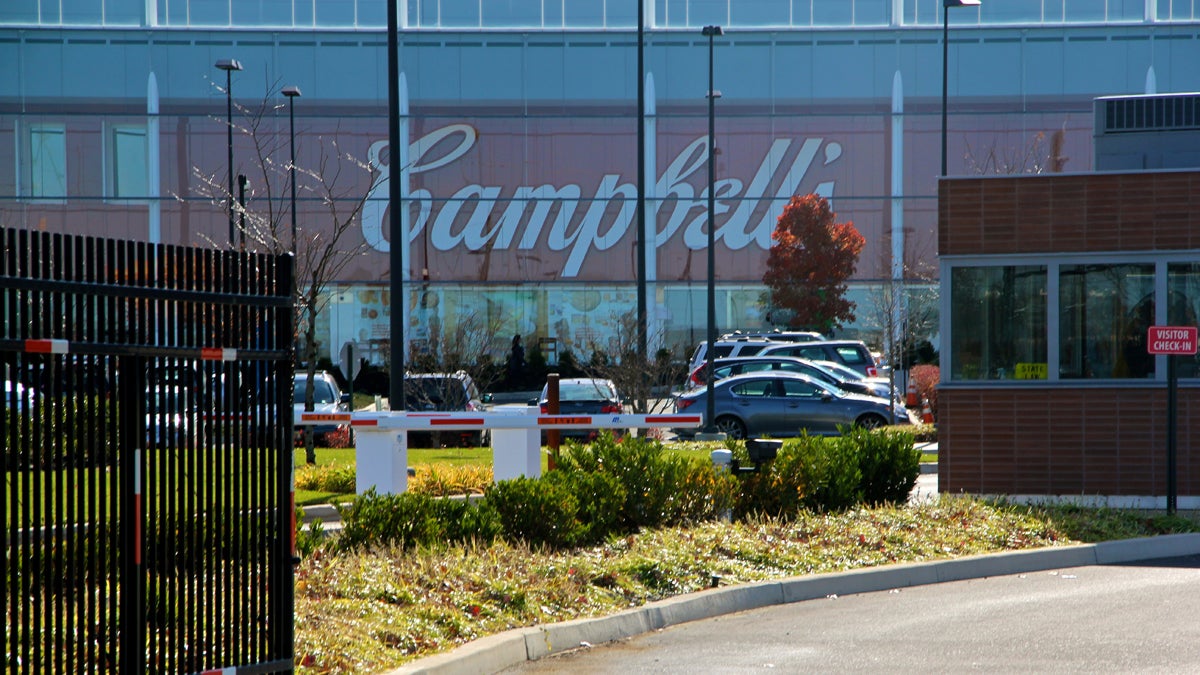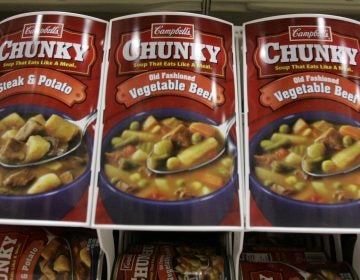Rejecting outright sale of the company, Campbell Soup will sell off fresh food division
Campbell Soup is not going up for sale, despite a flurry of speculation to the contrary.
Listen 2:05
The Campbell's Soup plant off South 11th Street in Camden. (Emma Lee/WHYY)
Campbell Soup is not going up for sale, despite a flurry of speculation to the contrary.
The Camden, N.J., food manufacturer announced Thursday it will instead try to reverse flagging earnings by selling off its fresh food and international divisions. The company will renew focus on its soup and snack brands.
“This is a new Campbell,” said interim CEO Keith McLoughlin during a Thursday morning earnings call.
Campbell has been the subject of intense public scrutiny over the last few months, following the retirement of its CEO and an announcement that the company had missed revenue goals. It prompted one high-profile New York City hedge fund manager to buy up shares in the company and try to publicly shame the 150-year-old firm into selling.
In a message to shareholders, McLoughlin suggested the company would shake up its business strategy to improve weak performance.
“Simply put, we lost focus,” he said.
Over the last six years, former CEO Denise Morrison attempted to move the company beyond its low-performing legacy brands like canned soup into other sectors of the food market, such as fresh foods and snacks.
In 2012, the company acquired Bolthouse Farms, which counts fresh carrots and salad dressings among its products, hoping to cash in on consumers’ preferences for organic and fresh food. Campbell also bought soup and beverage producer Pacific Foods, salsa maker Garden Fresh Gourmet, and the baby food company Plum Organics.
Campbell is now planning to sell Bolthouse Farms, Garden Fresh Gourmet, and its refrigerated soup business.
McLoughin said the company relied too much on mergers and acquisitions and pursued too many initiatives that made Campbell unnecessarily complex.
“We aggressively pursued the important consumer megatrend of health and well-being without having clarity on our source of uniqueness or whether we brought a competitive advantage to the space,” McLouglin added.
One major acquisition that appears critical to Campbell’s strategy going forward — which also happened under Morrison’s leadership — was the company’s purchase of snack giant Snyder’s-Lance for nearly $5 billion last year.
Morrison retired suddenly in May.
The purchase of Snyder’s-Lance ballooned Campbell’s debt to more than $9 billion, which worried investors who thought the company was spread too thin among its many brands while also increasing its financial obligations.
McLoughlin said selling off its fresh food and international interests would make Campbell the “leaner and more focused company that we need to become.”
At least one investor is likely to be unhappy with the company’s announcement.
Dan Loeb, the activist investor who runs the New York City hedge fund Third Point, criticized Campbell’s “years of abysmal oversight” in a filing with the Securities and Exchange Commission earlier this month. He bought a 5.6 percent stake in the company, hoping to influence decision-making.
Loeb said the only viable path forward for Campbell was an outright sale of the company.
While that idea has been shelved for now, the company is leaving the door open to a sale. “The Board remains open and committed to evaluating all strategic options to enhance value in the future,” the Campbell earnings report read.
McLoughlin reiterated the sentiment during the earnings call.
“We’re a public company,” he said. “We’re for sale every day.”
WHYY is your source for fact-based, in-depth journalism and information. As a nonprofit organization, we rely on financial support from readers like you. Please give today.



